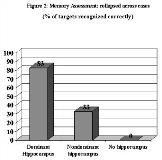WADA WITH TWO PATEINTS WHO HAD PREVIOUSLY UNDERGONE ANTERIOR TEMPORAL LOBECTOMY
Abstract number :
1.136
Submission category :
Year :
2005
Submission ID :
5188
Source :
www.aesnet.org
Presentation date :
12/3/2005 12:00:00 AM
Published date :
Dec 2, 2005, 06:00 AM
Authors :
Donald B. Burton, Pradeep Modur, Rebecca Woods, Edgar Pererra, and Mike Gruenthal
WADA testing is a standard part of the work-up for epilepsy surgery, and assesses the likelihood of new post-surgical language/memory deficits. We present the WADA results of two patients who had undergone anterior temporal lobectomy, but who had not been evaluated using the WADA. To our knowledge the results of WADA testing in patients who have already undergone anterior temporal-hippocampal resection has not been previously reported. These cases allow for a comparison of the following conditions in regards to memory function: dominant hippocampus, nondominant hippocampus, and no hippocampus. Our WADA procedure includes a mental status exam, memory acquisition, sequential language testing, and memory recognition. The demographic and surgical data of our cases is detailed in Table 1. Patient 1 had previously undergone a right anterior temporal lobectomy and patient 2 had a left anterior temporal lobectomy. Neither surgery resulted in seizure control, necessitating a new surgical work-up. Results reveal that both patients are left hemisphere dominant for language. The right hemisphere resection patient did not sustain a disruption in memory function as the result of right hemisphere injection, while injection of the dominant hemisphere disrupted memory. In contrast, the left hemisphere resection case displayed more functional memory deficit after nondominant hemisphere injection, while injection of both hemispheres suppressed memory compared to baseline. Figure 1 reveals that the no hippocampus condition resulted in total suppression of memory function for both cases. When the dominant hippocampus was functioning in isolation no disruption of memory function was noted compared to baseline. When the nondominant hippocampus was functioning in isolation memory function was significantly diminished, but not completely suppressed. Current results support the hypotheses that there can be a dominance for memory function that is not solely based on material specificity. Second, resection of the dominant hippocampus results in greater memory impairment compared to resection of the nondominant hippocampus. Third, current results suggest that the nondominant hippocampus can support memory function to an extent, although not at the level of the dominant hippocampus. Finally, our results highlight the need for a comprehensive presurgical work-up.[figure1][table1]
